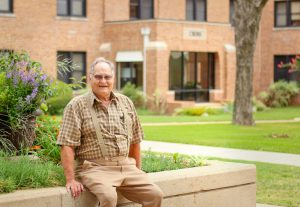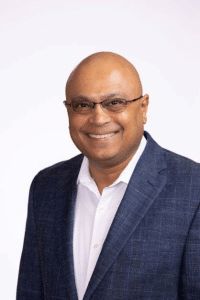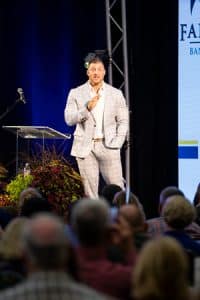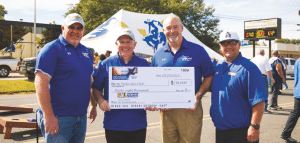 Dr. Larry McNeal arrived at Southern State College quite by accident in 1958, but stayed at the college that became Southern Arkansas University for 50 years.
Dr. Larry McNeal arrived at Southern State College quite by accident in 1958, but stayed at the college that became Southern Arkansas University for 50 years.
“My friend Don Henson and I were out at the lake about 10 miles south of Paris (Ark.), where I grew up,” McNeal said. “We were standing on the beach. This guy drove up, introduced himself, and said, ‘I’d like to offer you boys a football scholarship.’ I looked at Don, and he said, ‘Sounds all right to me. Where is Southern State?’”
To spend any time conversing with McNeal is to take a walk through decades of SAU history. He relates it in the form of personal stories, most of them funny, all of them illustrative of his passion for reaching students.
His strong belief in SAU and the mission of teachers inspired him to become one of the University’s most reliable donors. He is the longest-running donor with 40 consecutive years of giving, and said he believes that alumni who owe their careers to SAU have a responsibility to give back.
But that afternoon in 1958, on a lake south of Paris, McNeal had only barely heard of Magnolia.
“It was somewhere down around Louisiana,” he said. “I’d seen the name in the sports pages.”
Of the football scholarship, McNeal said, “The only offer we got was the best offer we got.”
“I played fullback at 165 pounds,” McNeal said, recalling his gridiron days. “The average age of our football team was in the 20s. We had one guy who was 35. We had a Marine. A lot of them were veterans. These were big guys. I remember getting into ‘Bull in the Ring.’ You made a ring and one guy gets in the middle and coach calls out a number, and the guy with that number comes out, and you try to stop him from killing you. They were knocking guys out. Well, I got off-center so I could move around. Coach called the number and the first guy I saw, I ran over and hit him! Coach said, ‘Way to be aggressive, McNeal, but try to find the man whose number I called.’”
McNeal said he and his teammates practiced in full pads three times a day. “You didn’t get a drink of water. They didn’t know about heat stroke. There was no AC, but we’d been working in the hay fields so we were used to the heat.”
Cross Hall was the athletic dorm in those days. The student athletes lived together and would often go to eat at a downtown boarding house.
“Paris had about 3,500 people and Magnolia might have had 8,000 so it wasn’t that big of a change,” McNeal said of moving to Southern State. “I didn’t have a vehicle; if you couldn’t catch a ride, you’d walk two miles to town.”
He was the first in his family to graduate college. “My older brother went to the UA; he went up there and had a good time but quit. I expected college to be unbelievably hard, I felt like I was going to have to study all the time to make a C. I took it seriously, unlike most freshmen, and that’s all because my brother scared me.”
McNeal majored in physical education and minored in English. He played football throughout college, getting “annihilated” by opposing players who were often bigger than him. “We didn’t win but two games my freshman year, but the next year we got back into the AIC and started playing Arkansas schools. We won more than we lost my last three years. We never did win the championship.”
He described his hometown of Paris as “a quiet little place. Dad was a military man. He alternated between the Army and the National Guard and got shipped off to Shanghai in the 1930s. He was in World War II for more than two years. Then he was in the Korean War. In Korea, they had the coldest winter on record. When he got home, he said to us, ‘I’d like to do something with you boys.’ We said, ‘Take us camping.’ He’d just spent the last two years camping! But Dad took us.”
At college, McNeal said he “got cocky.” In freshman English composition, his teacher was Inez Couch, who was so intimidating she scared McNeal straight. “I knew I could write a grammatical sentence but she told us to put our thoughts in a sequential outline. So I just start writing my thing. A shadow comes over my desk. She says, ‘May I see your outline?’ I said, ‘I got it right here,’ and tapped my forehead. She tore up my paper and said, ‘You’re dismissed.’
“Well, I couldn’t get kicked out. I went to her office and asked to come back. She said, ‘You have one chance, don’t mess up,’ and I didn’t. She helped me a lot.”
While taking courses, he worked part-time jobs in Magnolia. “I worked at Unit Structures in the summer and for Lewis Funeral Home and furniture store,” he said. “I got bored to death in the furniture store – I didn’t know enough about furniture to sell it. At the funeral home, I hated to hear that phone ring.”
McNeal graduated from Southern State in 1962. By then he had married the homecoming queen, Judy Sessoms, of Mount Holly.
“I wanted to coach. When I graduated, there was a shortage of teachers. In April, I signed to teach and coach at Camden. I said, ‘I’m through with college, I’m ready to go to work.’ In May, I got a call from the principal. He said, ‘We have a program with International Paper Co. to send our teachers to Auburn University to get a master’s. Would you be interested?’ I gritted my teeth and said that would be a wonderful opportunity. I did that for two summers.”
McNeal resigned from Camden to become a graduate assistant at Auburn, teaching swimming, soccer, and weight training. He graduated from Auburn on March 17, 1965, a time when Vietnam and racial tensions were ratcheting up. Southern State was hiring and McNeal got a job teaching. “’Nam’ was ramping up, and if you were in college, you got a deferment,” he said. “There was a huge increase in enrollment – Southern State hired 30 faculty and staff and 30 more the next year, the two biggest hiring periods ever at this institution. That’s how I got the job. I only had three years’ teaching experience and a master’s degree.”
Beginning in 1965, McNeal served as health, physical education and recreation teacher and intramural sports director at SAU.
“We had a great PE program,” he said. “Dr. Richard Carter, our chairman, believed in doing more than necessary. One of our C students went to a foundation in Texas where the college kids would … teach sports. The question was asked, ‘Who knows how to teach tennis?’ He raised his hand. ‘Who knows how to teach archery?’ He raised his hand. We taught it all! They made him the head of instruction, and he was just average.”
McNeal also excelled in badminton; he sponsored the Badminton Club, and helped bring a national tournament to SAU.
“We got the top badminton players,” he said. “I was beating all the students, but I wanted to play the national champion. When he came, nobody could get more than five or six points on him. He beat me 15-0. I’m dripping wet, and he says he needs to go warm up some more!”
Factor in volleyball and gymnastics, and McNeal said the SAU program was becoming so good that the president at the time “worried we’d be known as a PE institution! But we had good students making A’s and B’s in biology and math.”
McNeal taught dozens of sports activities, including kinesiology, theory of gymnastics, personal and community health, and graduate workshop in gymnastics. He taught for decades in the summer Upward Bound program. On an administrative level, he inherited an intramural program of 11 activities, which he had expanded to 50 “when I got through.”
He received his Ed. D. degree from North Texas State University in Denton, Texas, in 1971. He also served as the academic affairs assistant for more than three years. In that role, “the only students I knew were the ones being suspended.” He missed teaching so badly that he asked the academic vice-president if he could return to the classroom, and he was allowed to do so.
“I really enjoyed working with students,” he said.
He also enjoyed being director of continuing education and community service. “That was open-ended; you could do anything,” he said. “Personal computers were just coming out. I hired Betty Epley to teach a two-week course on how to use these computers. They were so popular.”
He expanded continuing education to include courses in death and dying, swimming, gymnastics and children’s theater. “My idea on all activities was to stimulate interest. We had over 1,000 enrollees in kid’s activities. We had a kindergarten program for five-year-olds. Today it’s called Kids College. We wanted to get them fired up and leave them hungry, so we did two weeks of that.”
McNeal stayed busy. “I spent from 8-5 in my office and then I’d go see about these night classes for adults and set up summer school programs. I hired Derek Skaggs. Derek had gotten a degree in community service from the University of Alabama at Birmingham. He couldn’t find a job. He became director of continuing education here. That was the fun part of my career as far as administration.”
In the early 1980s, McNeal worked for the College of Education. “They said, ‘We want you to teach Intro to Education Class and Field Experience I.’ These kids, they were thinking they might want to teach but were not sure what grade level or subject.”
He said students in the courses rotated through classrooms in Magnolia, Stamps, Waldo and other school districts “to observe as many different subjects and grade levels as they could. By the end of the semester, a quarter of them had changed what age group they wanted to work with. Some decided they didn’t want to teach. It was tough to work out, but the principals in all schools were cooperative and it was very useful.”
He was also involved in restoring SAU’s accreditation – and saving programs and jobs – when the Arkansas Department of Higher Education found that “inadequate records” had been kept, a ruling that resulted in the University being placed on probation.
“I was told a lady from Arizona was coming and that she was out to get us,” McNeal said. “I volunteered to coordinate our paper trail. I came at 8:00 every morning and left at 10:00 every night for a year. Every subject area was affected, and we had to have the cooperation of a huge number of faculty members. Their jobs were at stake.”
McNeal said he painstakingly addressed “every standard. It was a nightmare. I’m diabetic, and stress is like sugar. There was no way I could keep it under control. (The state) came and we met in Overstreet to get their report. We passed, and I breathed a sigh of relief and checked myself into the hospital.”
Though he was teaching History and Philosophy of Education, a course he loved, McNeal said he “went part-time” after the draining process of bringing SAU back from probation. “I taught part-time and went to the advising center, and I enjoyed it. I did that until last year. I spent 50 years as an employee at this institution.”
McNeal said SAU has “done a lot for me. I never had a day I didn’t want to come to work. It was challenging sometimes, but I knew it was worthwhile.”
He valued working closely with students. “I did a lot of impromptu counseling. When I taught health classes, somebody would want to talk to me. I’d try to get them to go to a counselor, but they didn’t know the counselor, they knew me. My job was to influence lives. I saw people turn their lives around.”
He gave the example of a male student who repeatedly cut class. “I told you, ‘cut one more time and I’ll drop you.’ He said, ‘if you drop me, I’ll lose my VA.’ Well, he cut, and I dropped him. He got mad and I told him he’d made his decision. He dropped out and got a construction job. Years later, he came back and said, ‘Do you remember me?’ I said, yeah. He said he got to thinking about what I said, and he wanted to come back. He did, and he got a job teaching.”
Of his years of giving, McNeal said SAU had “enriched my life immensely, and anything I can do to help other people … I’m glad I’m able to do that. My wife and I like to give to a lot of different areas.”
He said the University has people “who will go to the Nth degree to help you out. I’ve known English and math professors who’d be up here on Sundays, helping students. I tell people that the University has helped you make a better life, it would be nice if you could help someone else.”
McNeal credited SAU President Dr. Trey Berry. He has “done two things: one, he has started programs that we need to draw students, and two, he has expanded our area for recruiting. The engineering program is booming, and so are marine biology and computer science. I feel he is on the right path. He’s got the energy to make it happen, and he gets people to buy in. I’m thrilled to death he’s on board.”
He said giving is more important now than ever. “State funding is flat, which means it’s going down. We’re getting maybe 30 percent of every dollar from the state.”
Private money is still necessary to fund scholarships. “We need money. It’s a struggle for them (students). Or they are like my family, first-generation college students. They need more support. We have to develop them into college students.”
Gov. Asa Hutchinson has announced major changes in the funding formula for higher education. The proposed Higher Education Productivity Funding Model follows an outcomes-based approach which will place greater emphasis on program completion than the previous formula.
“If we’re going to fund based on graduation rates, that’s hard for us,” McNeal said. “It’s hard for a lot of universities our size. My question is, if a student has only two-to-three years of college, isn’t that better than not having any?”
McNeal said giving is also important in order to help SAU students avoid incurring too much debt. “You’re going to have to pay it back,” he said of federal loans. “It hurt me to see kids come into the advising center who weren’t making the grades, who owed $10,000-15,000. Anything we can do to help these students avoid a lot of debt would be very worthwhile.”




